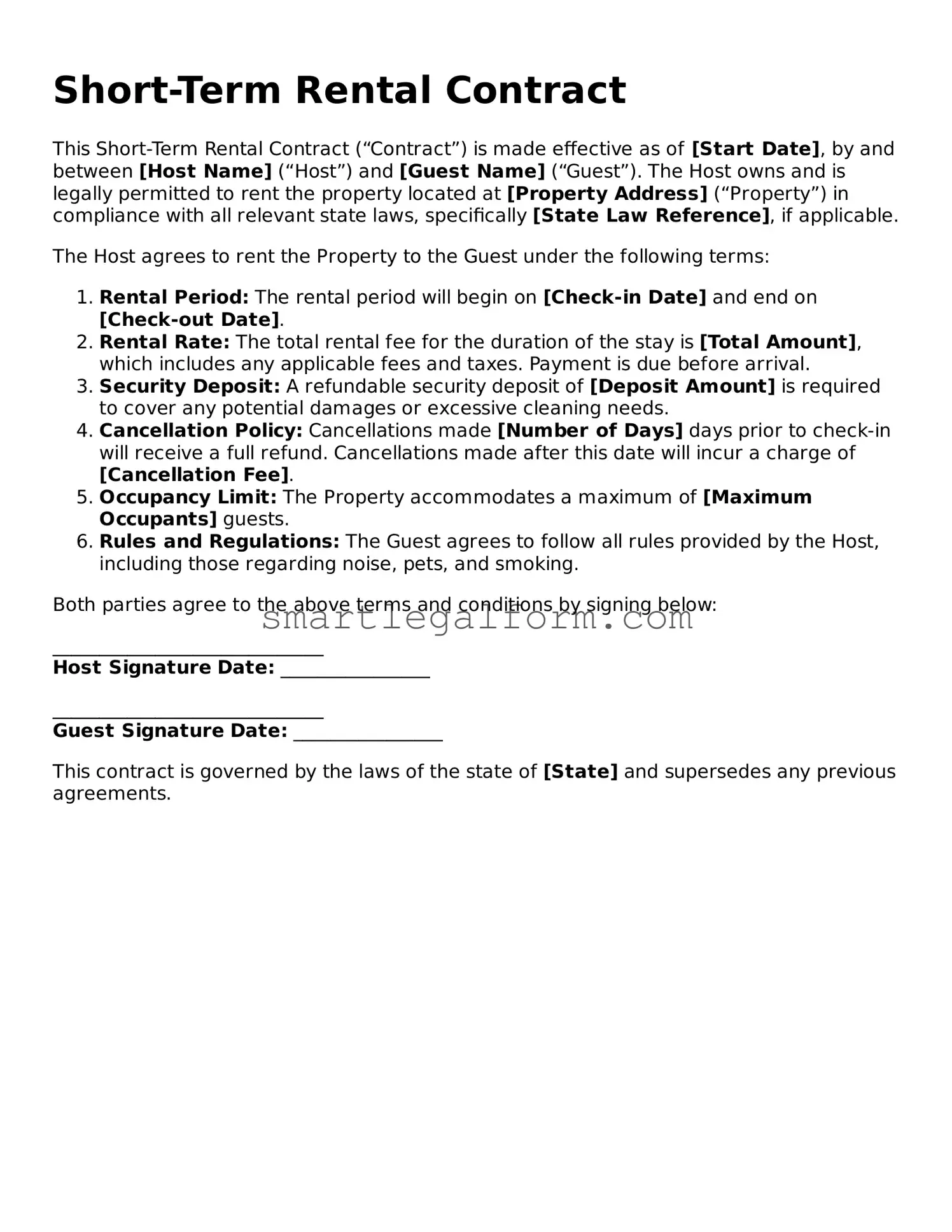Attorney-Approved Short-Term Rental Contract Form
Form Preview Example
Short-Term Rental Contract
This Short-Term Rental Contract (“Contract”) is made effective as of [Start Date], by and between [Host Name] (“Host”) and [Guest Name] (“Guest”). The Host owns and is legally permitted to rent the property located at [Property Address] (“Property”) in compliance with all relevant state laws, specifically [State Law Reference], if applicable.
The Host agrees to rent the Property to the Guest under the following terms:
- Rental Period: The rental period will begin on [Check-in Date] and end on [Check-out Date].
- Rental Rate: The total rental fee for the duration of the stay is [Total Amount], which includes any applicable fees and taxes. Payment is due before arrival.
- Security Deposit: A refundable security deposit of [Deposit Amount] is required to cover any potential damages or excessive cleaning needs.
- Cancellation Policy: Cancellations made [Number of Days] days prior to check-in will receive a full refund. Cancellations made after this date will incur a charge of [Cancellation Fee].
- Occupancy Limit: The Property accommodates a maximum of [Maximum Occupants] guests.
- Rules and Regulations: The Guest agrees to follow all rules provided by the Host, including those regarding noise, pets, and smoking.
Both parties agree to the above terms and conditions by signing below:
_____________________________
Host Signature Date: ________________
_____________________________
Guest Signature Date: ________________
This contract is governed by the laws of the state of [State] and supersedes any previous agreements.
Common mistakes
When filling out a Short-Term Rental Contract form, many individuals overlook crucial details. One common mistake is failing to provide accurate personal information. This includes names, addresses, and contact numbers. If the information is incorrect, it can lead to confusion or disputes later on. Always double-check these details to ensure they match your identification documents.
Another frequent error involves neglecting to read the terms and conditions carefully. Renters often skim through the document without fully understanding their rights and responsibilities. This can result in unexpected fees or penalties. Taking the time to read through the entire contract can help prevent misunderstandings and ensure both parties are on the same page.
People also tend to forget to specify the rental dates clearly. Leaving this information vague can create problems for both the host and the renter. If the dates are not clearly defined, it may lead to double bookings or confusion about when the property is available. Make sure to include precise check-in and check-out dates.
Lastly, many individuals fail to discuss and document any additional fees or deposits. This can include cleaning fees, security deposits, or pet fees. If these costs are not clearly outlined in the contract, it may lead to disputes later. Both parties should agree on all financial aspects upfront to avoid any surprises.
Dos and Don'ts
When filling out a Short-Term Rental Contract form, it is important to ensure that all information is accurate and complete. Here are five things you should and shouldn't do:
- Do read the entire contract carefully before signing.
- Do provide accurate personal and rental property information.
- Do clarify any unclear terms with the property owner or manager.
- Do keep a copy of the signed contract for your records.
- Do ensure all parties involved sign the contract.
- Don't rush through the form; take your time to avoid mistakes.
- Don't leave any sections blank unless instructed.
- Don't ignore any additional fees or terms listed in the contract.
- Don't sign the contract if you do not agree with its terms.
- Don't forget to check for any required deposits or payment deadlines.
More Types of Short-Term Rental Contract Forms:
Garage Rental Agreement - A Garage Lease Agreement can also indicate how property damage will be addressed.
For individuals looking to secure a rental property, understanding the nuances of a well-crafted residential lease agreement template can be invaluable. This document not only delineates the responsibilities of the landlord and tenant but also provides a framework for resolving disputes and ensuring compliance with local rental laws.
Rent Increase Notice Sample - Provide any pertinent information regarding the timeline of the increase.
Similar forms
-
Lease Agreement: A lease agreement outlines the terms under which a property is rented, similar to a short-term rental contract. Both documents specify the duration of the rental, the amount of rent due, and the responsibilities of both the landlord and tenant. However, a lease agreement typically covers a longer duration, often a year or more, while a short-term rental contract is designed for shorter stays, often less than 30 days.
- Lease Agreement: Like the Short-Term Rental Contract, a lease agreement outlines the terms between a landlord and a tenant for renting a property. Both documents cover rental duration, payment terms, and responsibilities. For further insights, refer to All Texas Forms.
-
Rental Application: A rental application is used to gather information from potential tenants before entering into a rental agreement. Like a short-term rental contract, it assesses the suitability of the renter, including their financial history and rental background. Both documents aim to ensure that the property owner can make informed decisions about who will occupy their property.
-
Property Management Agreement: This document is similar in that it outlines the responsibilities of a property manager when overseeing a rental property. Both agreements address the management of the property, including maintenance and tenant relations. While a short-term rental contract focuses on the specific terms of a guest's stay, a property management agreement covers broader operational aspects.
-
Guest Registration Form: A guest registration form collects essential information from individuals renting a property, much like a short-term rental contract. Both documents require details such as the guest's name, contact information, and identification. However, the guest registration form is often used to gather information at check-in, while the rental contract serves as a binding agreement for the rental terms.
